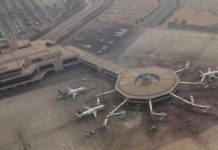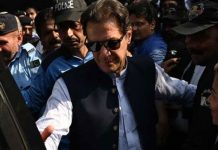By Qamar Bashir
During President Donald Trump’s recent visit to the Middle East, one major theme emerged with clarity and significance: the transformative use of money, investment, and trade as strategic instruments of diplomacy. The Gulf states, particularly Saudi Arabia, the UAE, and Qatar, have recognized that in the current global order—where hard power has its limits—economic might can achieve what missiles and tanks cannot. They applied this new doctrine with precision, targeting none other than the most powerful man on earth—President Donald Trump himself.
Trump, a successful businessman known globally for his admiration of wealth and commerce, has consistently prioritized economic gain over military entanglements. Recognizing this, the Gulf states unveiled a diplomatic strategy rooted not in coercion but in commerce—offering billions in trade deals, unprecedented investment pledges, and economic opportunities tailored to revitalize the U.S. economy under Trump’s leadership.
At the heart of this strategic courtship lies a humanitarian and moral objective: the liberation of Palestine and the cessation of Israel’s brutal war on Gaza. But unlike past attempts, this was not a call to arms. The Gulf states chose not to challenge Israel through kinetic military engagement. They knew that a military confrontation with the U.S.-backed Israeli war machine would bring catastrophic consequences—not just for their own nations, but for the broader Islamic world and global stability.
Instead, the Gulf’s leaders—Crown Prince Mohammed bin Salman of Saudi Arabia, Sheikh Mohammed bin Zayed of the UAE, and Sheikh Tamim bin Hamad Al Thani of Qatar—adopted a wiser, calculated approach. By opening the gates of their economies to American companies, pledging over $13 trillion in long-term investments, and offering deep trade concessions, they provided Trump with the very lifeline he needs to fulfill his campaign promises: jobs, prosperity, and economic resurgence.
Speaking alongside these leaders, President Trump praised the Gulf’s transformation and economic evolution. He marveled at the skyscrapers, the architectural brilliance, and the futuristic cities rising from the desert. “Riyadh is becoming not just a seat of government but a major business, cultural, and high-tech capital of the entire world,” he stated. Trump emphasized that what he witnessed was unlike anything seen before, acknowledging that the transformation “has not come from Western interventionists,” but from the people of the region themselves.
In his address, Trump also noted that the Gulf nations have done what even the most sophisticated Western efforts failed to do in Kabul or Baghdad: build cities of prosperity, peace, and purpose through self-driven visions, national pride, and smart investments.
In parallel, the Amir of Qatar echoed a message of interconnected peace. “Americans and Qataris want peace,” he said. “I believe we have a God-given duty to bring about peace. I truly believe that you [Trump] are a president of peace.” He emphasized the urgency of diplomacy, revealing that U.S. and Qatari teams were working intensely to achieve a ceasefire in Gaza, protect civilians, and secure the release of hostages. The Amir added that resolving this conflict is essential to broader regional stability, from the West Bank to Yemen and Lebanon.
In exchange, the Gulf states put forward a united, unambiguous demand: an end to Israeli aggression in Gaza and a durable, just solution to the Palestinian issue in line with numerous United Nations Security Council resolutions. The message was unmistakable: continued economic engagement is contingent on peace and justice in Palestine.
This strategy represents a dramatic shift in the geopolitical toolkit of the Muslim world. In earlier decades, Muslim nations responded to Israeli aggression with protests, condemnations, and sometimes military retaliation. But such measures proved ineffective against the combined might of the United States and Israel. Worse, these moves exposed their societies to economic destruction, political instability, and social upheaval. This time, however, the Arab world has chosen intellect over instinct.
They have not compromised their solidarity with Palestine. They have not abandoned their moral compass. Rather, they have recalibrated their instruments of power. They know that economic interdependence can shape political behavior more effectively than empty threats or symbolic resolutions. And they know that Trump, in his second term, is focused more than ever on economic revival—and less interested in military adventures that drain national wealth.
In the same breath, they have offered Trump something Israel cannot: massive foreign direct investment, expanded trade opportunities, and access to the most rapidly transforming economies in the Middle East. Unlike Israel, whose leverage in Washington lies in political lobbies, media influence, and campaign financing, the Gulf states bring real money—tangible, immediate, and essential for Trump’s domestic success.
One of the most telling decisions during this Gulf tour was President Trump’s deliberate omission of Israel from his itinerary. Unlike past U.S. administrations that prioritized visits to Tel Aviv or Jerusalem, Trump focused solely on Saudi Arabia, the UAE, and Qatar. Analysts believe this move signaled a subtle but significant sidelining of Israel. While not a break in relations, it underscored Trump’s recalibration of U.S. foreign policy toward economic pragmatism and away from ideological commitments. The Trump administration appears increasingly aware that its core interests—regional stability, economic growth, and diplomatic influence—can no longer be chained to Israel’s hardline policies.
Moreover, recent diplomatic breakthroughs such as the ceasefire with the Houthis, the initiation of U.S.-Iran nuclear talks in Muscat, and even discussions on lifting sanctions on Syria, were achieved without Israeli involvement. The release of an Israeli-American hostage by Hamas also occurred without Israeli mediation, indicating a shift in the U.S.’s diplomatic channels. Trump’s administration, thus, seems to recognize that Israel is no longer the sole or even central conduit to Middle Eastern peace. Instead, the Gulf monarchies have emerged as credible, effective interlocutors.
The brilliance of this strategy lies in its dual-edged nature. If Trump aligns with the Gulf and distances the United States from Israel’s unrelenting war on Gaza, the economic windfall will flow freely into America. If he refuses, the Gulf states now hold the power to stall or withdraw these investments, undermining Trump’s economic narrative and denting public optimism, investor confidence, and stock market momentum. For a president who thrives on optics, numbers, and headlines, this risk is substantial.
Moreover, the Gulf’s economic leverage has created a rare window of opportunity for the Palestinians. If Arab investments become more appealing to the United States than the traditional Israeli lobby, Washington’s strategic calculus could tilt in favor of a Palestinian peace settlement. Israel, long dependent on unwavering American support, may then be forced to reconsider its policy of occupation, siege, and indiscriminate violence in Gaza.
This dynamic does not mean that Israel’s influence in Washington has vanished. Far from it. The Israeli lobby—anchored by powerful individuals, corporations, and media empires—still wields considerable power in U.S. politics. Through campaign donations, think tanks, and lobbying groups, it shapes congressional behavior and White House policies. But what the Gulf nations are now offering is not influence—it is impact.
They are not seeking to match Israel’s political muscle dollar for dollar. Instead, they are offering a vision of partnership rooted in mutual benefit: American economic gain in return for geopolitical fairness. In this vision, Palestine is not a bargaining chip—it is a litmus test of justice and moral leadership.
This shift in strategy should not be underestimated. The Muslim world, long accused of being reactive, fragmented, and militarily ineffective, is now demonstrating strategic maturity. It is using its comparative advantage—wealth, markets, and investment capital—to shape global events in its favor. Even Turkey and Iran, who historically adopted more confrontational stances, are now aligning with this economic approach, recognizing its effectiveness and global appeal.
This is not appeasement—it is adaptation. It is the realization that military conflict with Israel, backed by a nuclear-armed superpower, is futile. It is the acknowledgment that winning hearts, markets, and boardrooms in Washington may prove more transformative than battlefield victories.
At a time when Gaza lies in ruins, thousands of innocent Palestinians are dead, and the global conscience remains disturbed, this new approach offers hope—real, actionable hope. It offers a way forward not just for Palestinians, but for all Muslims who have long desired a peaceful and dignified resolution to one of the most enduring injustices in modern history.
If President Trump truly wishes to be remembered not just as a builder of hotels but as a maker of history, he must embrace this opportunity. He must realize that aligning with the economic powerhouses of the Muslim world may not only secure American prosperity but also secure his own legacy as a peacemaker.
And for the Muslim world, the message is clear: the era of kinetic power and military posturing is fading, giving way to an age where economic influence and financial diplomacy reign supreme. Now is the time to construct, invest, and shape outcomes through prosperity—not to destroy, fragment, or surrender to despair.
By Qamar Bashir
Press Secretary to the President (Rtd)
Former Press Minister at the Embassy of Pakistan to France
Former MD, SRBC
Macomb, Michigan, USA

















